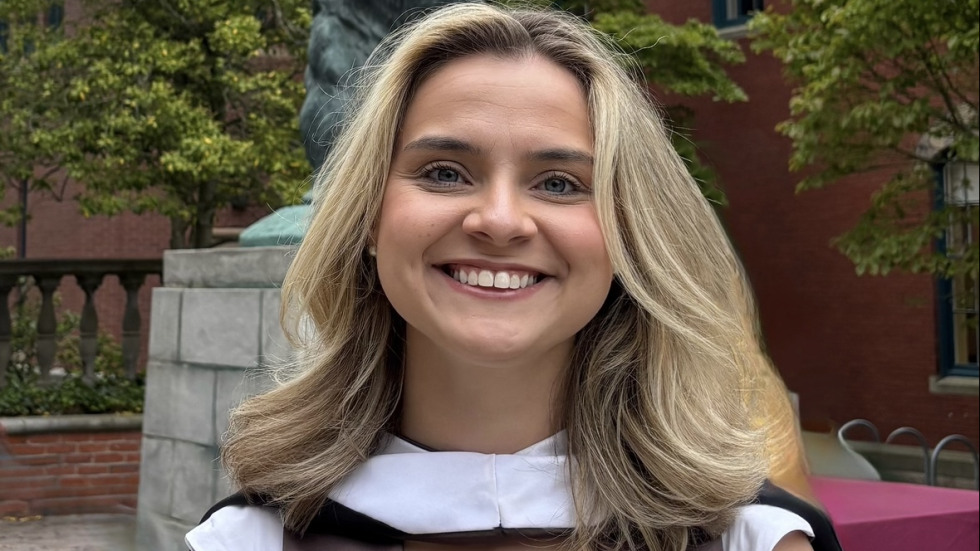Name: Lizzy Wendel
Hometown: Chappaqua, NY
Program: Urban Education Policy
Education: BA in Neuroscience & Behavior from University of Notre Dame ‘22, MEd in Secondary Education from Rhode Island College ‘23
Current Position: Education Specialist at the U.S. Court of Appeals for the Federal Circuit
What was the most memorable or impactful part of your experience in the UEP program?
The best part of the UEP program was my classmates. What made UEP stand out from other formal education programs I’ve completed was how intentionally it encouraged us to bring our lived experiences into the classroom. My cohort brought such a wide range of insight and perspectives on what it’s like to be part of the Providence school system. We had people in the room who were PPSD students themselves, as well as teachers, paraprofessionals, administrators, parents, and nonprofit leaders. The diverse perspectives and the space we created together made the learning so much more meaningful because I could see in real time how the ideas we discussed connected to the realities people experience every day. I loved being able to have these conversations with my classmates at night and then go to my teaching job the next morning to immediately put those insights into practice.
Can you share a specific moment, project, or lesson from the program that has stuck with you?
An assignment that really stuck with me was the comment mapping project we did in Professor Lesure’s “Race and Democracy in Urban Education Policy.” Every week, we had to connect our academic readings to comment sections we found “in the wild” on Reddit, YouTube, or Facebook. It was fascinating to see how the complex topics we read about in scholarly articles were showing up in casual online conversations. People are talking about these same issues all the time; you just might not notice it until you really dig in. Those assignments helped me see how theory and public dialogue are always intersecting, and it made me a lot more attuned to the ways people make meaning and share ideas outside of formal academic spaces. It also showed me that these conversations are accessible and happening all around us; academia isn’t a bubble that only exists in lecture halls or journal articles.
What have you been doing professionally since graduating?
Since graduating in May, I’ve transitioned from Providence, where I taught special education science at Central High School in PPSD for three years, to Washington, D.C., where I’m now an Education Specialist at the U.S. Court of Appeals for the Federal Circuit. While I loved every second of teaching, my personal life brought me to D.C. (I recently got engaged!), where I found an incredible opportunity at the court.
In this role, I work at the Federal Circuit Center for Innovation & Law, which is the nation’s first courthouse-based learning center that brings together law, history, and science through hands-on, immersive experiences. It’s important to me that students have open-door access to spaces like these – especially those who might not have always seen the judicial system as something that works for or with them.
Which skills or lessons from the UEP program have been most valuable to you in your career so far, and how have you applied them?
Two of the most valuable lessons I took from UEP are about asking better questions, about both systems and people.
First, I’ve learned to think more critically about why a policy exists and who it’s really for. UEP pushed me to look at the historical events and movements that have shaped today’s policies, and to question the narratives we often take at face value. It’s made me a more critical citizen. When I hear discussions about education policy in the news, I can recognize how certain reforms are often framed as empowering but have roots in marginalizing certain communities.
Second, I’ve become much more thoughtful about workplace and institutional dynamics. It’s easy to think of an organization as an abstract system, but UEP helped me see that institutions are made up of people, each with their own experiences, power, and constraints. Understanding those human dynamics, the informal collaborations, and the culture of a workplace is essential to actually making change from within.
What changes have you seen in the field of education since you graduated, and how do you think the UEP program prepared you to adapt?
Even in just the short time since graduating, I’ve noticed a growing focus on connection: between education and other fields, between schools and communities, and between learning and the world beyond the classroom. There’s been an increased emphasis on experiential learning and helping students see how what they’re learning connects to real systems and structures that shape their lives. Collaboration beyond the classroom is essential for putting education in context. You can take the reins in your community, no matter what some people may want you to think.
UEP prepared me for this shift by teaching me to think critically about how education operates within a broader ecosystem. The program challenged me to examine power, equity, and policy not as abstract ideas, but as forces that shape real experiences. That lens has helped me adapt as education becomes more interdisciplinary, and it’s something I carry into my work every day at the Center for Innovation & Law, where we help students make those same connections between learning, civic participation, and innovation.
What’s one piece of advice you’d give to someone considering applying to the program today?
Pick an internship site that challenges you. It’s the perfect opportunity to explore a sector of education you haven’t had experience with before or to develop a new skill set you haven’t had the chance to build. You’ll have so much support and so many opportunities to talk through challenges with your classmates in an environment that’s proactive, reflective, and solution-oriented.
